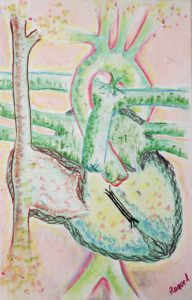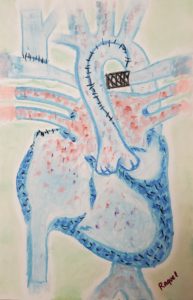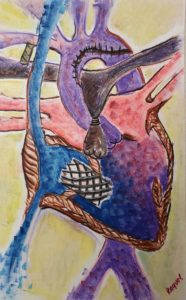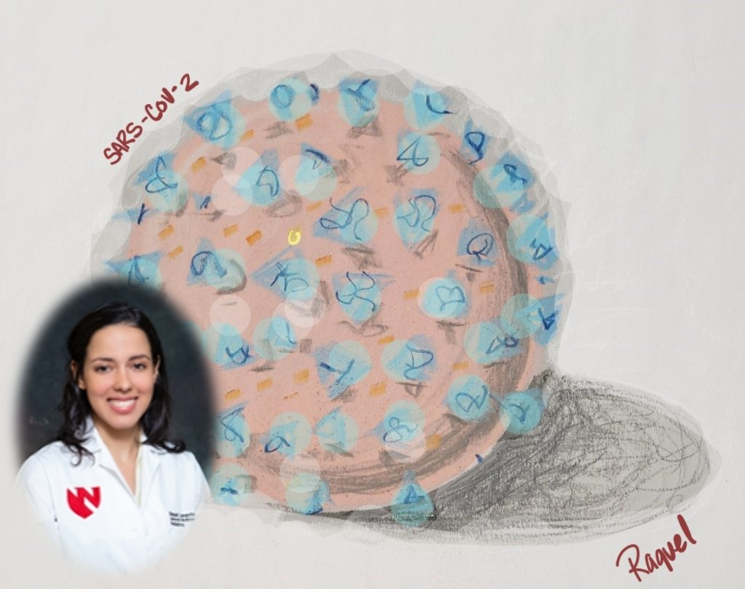As our institution, state, country, and the world grapple with the impacts of SARS-CoV-2, causing COVID-19, there are lots of ongoing discussions about coronaviruses. Dr. Raquel Lamarche is a PGY1 Internal Medicine/Pediatrics resident at UNMC, who will be sharing her thoughts and information she learns about COVID-19. You can follow Dr. Lamarche on Twitter @LamarcheRaquel. This week Dr. Lamarche discusses “Wellness in the time of COVID-19“.
Being a doctor is stressful. Whether you are an attending striving to set up a positive atmosphere for learning and patient care, a resident transitioning into a different work-environment every 4-weeks, or an immigrant trying to master a new language and healthcare system: This profession is no walk in the park. The COVID pandemic (and the political circus that has accompanied it) has caused a myriad of additional stressors. Here are some real quotes from healthcare professionals like you and me:
 “I worry that my 1-year old might not be receiving all the stimuli he needs during this critical time of his development; he is not learning from the world… he has not seen other children in over five weeks.”
“I worry that my 1-year old might not be receiving all the stimuli he needs during this critical time of his development; he is not learning from the world… he has not seen other children in over five weeks.”- “I feel guilty that I am not in the frontlines [like some of my friends]; I am not helping out like they are.”
- “Concern[ed] I might carry the virus to my family.”
- “My loved ones are losing their sources of income.”
- “I feel constricted. I wish I could travel and physically connect with my support system.”
- “I can’t be there for my loved one who is sick with this virus.”
“I am exhausted…we don’t have the supplies, the ventilators, the PPE, to take care of everyone. I don’t want to do this anymore.” - “It is just too much high priority information and e-mails. It feels impossible to stay up to date and adequately appraise available data.”
Even before the pandemic, physicians have been notorious for taking work anxieties home with them. Similarly, when I was in art school, I noted my teachers would live in a 24/7 state of unstoppable craft. I figured that certain professions are not merely an 8 am-5 pm appointment; they are part of who we are. It should also be within our power to make this journey a sustainable one. Knowing that healthcare is subject to VERY rapid and complex changes, the ability to adapt and heal is paramount, for it is when our wellbeing is most challenged that it is also most critical.
With this post, I don’t intend to generate more anxiety by linking to three thousand resources. My hope is that we learn to be well while we work, and that we share with each other our perspectives on wellness. Here are a few of the things that I am currently working on:
 1. Be yourself. In healthcare, you cannot afford to waste any energy trying to be “conventional” in exchange for acceptance; chances are this won’t be gratifying. So, put your big girl/boy pants on and be proud of who you are. For example, I find small talk mentally draining; conversely, silence, and listening to the sounds in my environment are recharging; so I allow myself to be silent when I need to, and it feels is amazing. I also move a lot while I work; it is one of the ways I channel emotions. If I feel anger, anxiety, or sadness, I can process the emotion by doing some push-ups, or a sun salutation, and I try not to wait until I get home; it takes less than 2 minutes and it keeps me from accumulating body and mental tension. Also, during the virtual learning/zoom conferences, I am usually holding yoga postures or doodling – this further increases my resilience for that day, it helps me stay present, and have a better recall of the information later on. It’s like I am providing my brain with this extra association that feels very familiar (e.g. we spoke about sleep apnea treatment when I was holding a tree pose). The days that I allow myself to just be, I feel I am not in a rush to go home in order to relax. This takes courage since you don’t want to make others feel uncomfortable, but I think that as long as there is no objective harm, it is worth it to be yourself.
1. Be yourself. In healthcare, you cannot afford to waste any energy trying to be “conventional” in exchange for acceptance; chances are this won’t be gratifying. So, put your big girl/boy pants on and be proud of who you are. For example, I find small talk mentally draining; conversely, silence, and listening to the sounds in my environment are recharging; so I allow myself to be silent when I need to, and it feels is amazing. I also move a lot while I work; it is one of the ways I channel emotions. If I feel anger, anxiety, or sadness, I can process the emotion by doing some push-ups, or a sun salutation, and I try not to wait until I get home; it takes less than 2 minutes and it keeps me from accumulating body and mental tension. Also, during the virtual learning/zoom conferences, I am usually holding yoga postures or doodling – this further increases my resilience for that day, it helps me stay present, and have a better recall of the information later on. It’s like I am providing my brain with this extra association that feels very familiar (e.g. we spoke about sleep apnea treatment when I was holding a tree pose). The days that I allow myself to just be, I feel I am not in a rush to go home in order to relax. This takes courage since you don’t want to make others feel uncomfortable, but I think that as long as there is no objective harm, it is worth it to be yourself.
2. Master the boring stuff. These are the oh NOT so fascinating aspects about our jobs, but stuff that we need to know in order to have an efficient command of the health care system. In art school, this would be equivalent to an hour of drawing spheres or rectangles. In healthcare, this entails understanding policies/protocols, RVUs, peer to peers, institutional status quo, billing and coding, long excel sheets, coordination of care, who should I call first, and all that non -sense. First of all, I think reading about any of the above topics is excruciatingly painful and destroys my medicine-loving inner unicorn…So, to learn “the boring stuff” I go to my tribe of colleagues and attendings. I directly observe them during specific situations, and ask as many questions as an annoying intern possibly can. I feel it is easier to remember dry subjects when you had a micro-discussion about them. The end goal is to be at complete ease with the parts of medicine that you might dislike, but that your employer and third-party payers believe to be “essential”.
3. Minimalism plays a major role in my well-being. I believe in having things that add value and joy to life. Here are some examples of how I apply minimalism:
• I don’t accumulate tasks if I don’t need to; I get it done as soon as possible without thinking about it too much.
• Avoiding wasting time on it if it has no value, for example: If I don’t have the energy to reply emails, I won’t look at my emails in that moment.
• I try to have 1 small goal per day, only one.
• Take care of what I have, even if I can afford new things.
4. Have a self-care affirmation ritual. It could be something that starts like, “wake up: today you are worthy of getting up and taking care of yourself”.
5. Protect yourself and your loved ones. The best you can do is using the appropriate precautions at work during your patient encounters. It is a good idea to change clothes once you get home and wash them as soon as you can. You are not required to separate from your family at home if this would create an unnecessary strain on your wellbeing, but if separating from them improves your wellbeing by removing concern that you carry the virus home to them, do what keeps you well.
At our institution, UNMC, we have access to many UNMC Wellness Resources, and hope that these kinds of resources are available across the country for all the healthcare professionals who may need them.
 I believe that integrating all of you to any work you do is key! Feeling like you are neglecting some dimensions yourself by doing a job can generate more tension than needed. Drawing is one of my essential components of keeping myself well. I included some drawings of my little kid patients’ hearts. Drawing these hearts was fun and helped me commit to memory congenital heart disease physiology. I would love for you to share with me what works for you!
I believe that integrating all of you to any work you do is key! Feeling like you are neglecting some dimensions yourself by doing a job can generate more tension than needed. Drawing is one of my essential components of keeping myself well. I included some drawings of my little kid patients’ hearts. Drawing these hearts was fun and helped me commit to memory congenital heart disease physiology. I would love for you to share with me what works for you!
